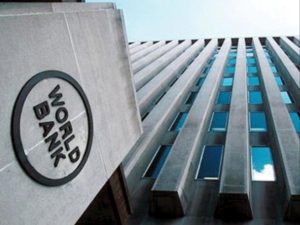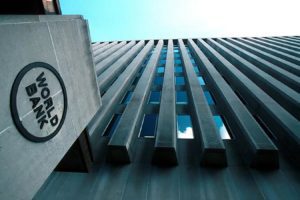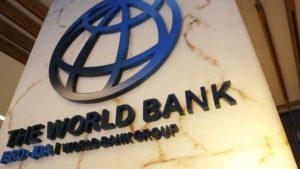
The World Bank has improved the forecast for Ukraine’s GDP growth in 2019 from 3.4% to 3.6%, World Bank Senior Economist Anastasia Golovach has said.
“For 2019, we do not expect any surprises and we think that Ukraine’s GDP will grow by 3.6%. A good indicator, but external risks, in some way, are increasing for Ukraine, so the structural transformation of the economy is important,” she said at a press conference in Kyiv on Tuesday.
She noted that maintaining the current rate of economic growth will require an increase in capital investment, which amounted to 10% last year. This will require a greater influx of foreign direct investment.
At the same time, the bank kept forecasts of economic growth in 2020 at 3.7% of GDP, in 2021 at 4.2%, she said.
According to the banker, the deficit of the balance of payments in Ukraine in 2019 is expected to reach 3.1% of GDP, however, due to the potential loss of gas transit revenues and the unfavorable situation in the world markets, this figure will increase in 2020 and 2021 to 3.6% and 3.8% of GDP.
“But subject to rapid reforms, we expect in the next month that Ukraine will be able to maintain the economic growth rate at 3.7% in 2020 and accelerate it to 4.2% in 2021,” Golovach explained.
“An important factor in reducing pressure on the budget deficit is control over current budget expenditures and a balanced reduction in the minimum wage this year – only at the level of 12%, which is very contrasted with the previous years,” Golovach said.
Moreover, according to her, inflation will continue the downward trend: from 9.8% at the end of last year to 6.4% by the end of this year, as well as 5.5% and 5% in 2020 and 2021 respectively.
According to the bank’s expectations, in 2019 the deficit of the national budget of Ukraine will show a decrease to 2.1% in 2020 and 1.9% in 2021.
The World Bank believes that the level of public debt of Ukraine will also continue to decline this year to 51.7% of GDP. At the same time, the bank maintained the forecast for its further growth in 2020 and in 2021 to 54.6% and 55.3% of GDP respectively.

The World Bank has expressed its strong support to land reform in Ukraine and praised its necessity to all market participants.
“The World Bank strongly endorses the plans of Ukrainian leadership to open the agricultural land market. Land reform is needed for Ukrainian farmers to buy and sell agricultural land, access credit, invest and diversify, as well as land owners to get proper return for their most valuable asset,” the World Bank said in its statement posted on Facebook on November 9.
The statement reads that all farmers, including small, medium and large, and landowners will benefit from the opening of the land market.
“It raises economic growth as well as living standards of all Ukrainian people by unleashing the country’s agricultural potential. The planned reform also includes measures to limit land concentration, stop raider attacks and provide financial assistance for small farmers. Two decades of a closed market and non-transparency that fosters corruption are enough: the time for land reform is now,” the World Bank said.

The World Bank, taking into account the results of H1 2019, has improved its forecast for gross domestic product (GDP) growth in Ukraine in 2019 from 2.7% to 3.4%, expecting that it would accelerate to 3.7% and 4.2% in 2020 and 2021 respectively.
“If the new government is able to deliver on its ambitious reform goals, growth can increase to 4% by 2021,” the World Bank said in its October report entitled “Migration and Brain Drain.”
The analysts said that this will require progress in the following areas: reviving sound bank lending to the enterprise sector by completing the reform of state-owned banks; attracting private investment into tradable sectors by establishing a transparent market for agricultural land, demonopolizing key sectors and strengthening antimonopoly policy and enforcement, privatizing state-owned enterprises, and tackling corruption; and safeguarding macroeconomic stability by addressing current expenditure pressures, securing adequate financing, further reducing inflation, and rebuilding international reserves.
If reforms do not progress and adequate financing is not mobilized, growth could fall below 2% as investor confidence deteriorates, macroeconomic vulnerabilities intensity, and financing difficulties force a compression in domestic demand. Ukraine will need to safeguard macroeconomic stability and manage fiscal risks.
According to the expectations of the World Bank, in 2019, the deficit of the national budget o Ukraine would be 2.2% of GDP. The figure would decrease to 2.1% of GDP in 2020 and to 1.9% of GDP in 2021.
According to the World Bank’s forecast, the public debt will also continue to decline this year to 53% of GDP, but will grow in 2020 and in 2021 to 54.6% of GDP and to 55.3% of GDP, respectively.
As indicated in the materials, the current account deficit will continue to grow: in 2019 – to 3.5% of GDP, in 2020 – to 3.8% of GDP and in 2021 – to 4.3% of GDP.
At the same time, the bank expects a slow increase in net foreign direct investment (FDI) inflows in 2019 and 2020 to 2.2% of GDP and 2.3% of GDP, respectively.
At the same time, inflation will take a downward trend: from 9.5% at the end of last year to 6.8% this year, as well as 6% and 5.4% in 2020 and 2021, respectively.
According to the report of the World Bank’s experts, the main risk for the Ukrainian economy is formidable financing needs. So, according to the analysts, it will take about $11 billion per year, or 8% of GDP, to pay off government debt and finance the budget deficit in the current and next two years.
“To raise the necessary financing, it is critical to maintain the reform momentum and fiscal discipline, while continuing cooperation with development partners,” the bank said in the report.

The World Bank invites the Ukrainian government to consider the creation of the Partial Credit Guarantee Agency as a special financial tool that will allow small and medium-sized agricultural producers to receive financing for the acquisition of land after the launch of the market. “Partial guarantee for loan contributions is the best option for Ukraine,” Lead Financial Sector Specialist for the Finance and Markets Global Practice in Belarus, Moldova and Ukraine Vahe Vardanyan said at a press conference on Thursday.
According to him, at least half of the countries have introduced government partial guarantees as a way to facilitate access to loans. There is also the practice of creating specialized partial guarantees designed specifically for agriculture, for example, in Mexico and Colombia, he said.
In order to receive partial guarantees, the farmer applies for a loan to a bank, which analyzes the application and determines the need for partial guarantee, then the bank contacts the Credit Guarantee Agency. The latter checks the compliance criteria and carries out risk analysis, approves and provides a partial credit guarantee, receives a fee from the bank for issuing the guarantee. Further, the bank provides a loan secured by partial guarantees.
In addition, the World Bank said that the Credit Guarantee Agency (company/fund) is usually a non-banking financial institution, it has its own: management, governance, capital, operating procedures. The legal structure of the agency allows for a mixed type of ownership at a certain stage, the government is not always a full owner. The National Commission for Financial Service Markets Regulation exercises supervision as over a non-banking financial institution.
All over the world, guarantee agencies are state-owned, co-financing, public private partnership is possible, but this is about joining after the first year of the institutions’ work, World Bank Country Director for Belarus, Ukraine and Moldova Satu Kahkonen said.
CREDIT GUARANTEE AGENCY, FARMERS, FINANCE PURCHASE, LAND, WORLD BANK

President of Ukraine Volodymyr Zelensky during a meeting with World Bank President David Malpass has confirmed his intention to carry out land reform, complete the unbundling of Naftogaz, demonopolize the economy and state-owned enterprises, and respect the independence of the National Bank. Malpass wrote on his FT blog following a meeting with Zelensky that at their meeting Zelensky had confirmed several key growth measures that will be mentioned at the meetings with G7: implement the land reform, split ownership of Naftogaz’ transit assets, demonopolize the economy and state-owned enterprises, and respect the independence of the central bank.
According to Malpass, to attract investment in Ukraine, it is necessary to eliminate monopolies in favor of market competition and strengthen the rule of law.
Capital should be send to the most productive enterprises but not to influential privileged circles and oligarchs, he said.
Malpass also emphasized the importance of land reform.
The country has the largest stock of agricultural land in Europe, but the yield per hectare is only a small part of the crop in France and Germany. At the same time, one oligarch controls a group of companies that produces more than 80% of domestic output of several types of mineral fertilizers, the banker said.
As reported, World Bank President David Malpass on August 22-23 for the first time visited Ukraine after he has taken this post on April 9, 2019.

NJSC Naftogaz Ukrainy has completed repayments under the loan agreements worth $500 million received under the World Bank’s guarantees and state guarantees, the press service of the company has reported.
According to Naftogaz, within the framework of these loan agreements, which were signed on December 30, 2016, the company managed to purchase about 5 billion cubic meters of natural gas from the European direction over two years.
“In general, since 2014, Naftogaz has redeemed the state-guaranteed loan debt amounting to about $3.2 billion in a timely manner and in full. Naftogaz’s loan portfolio has decreased by 6.6 times since 2014 and is a record low,” Naftogaz CEO Andriy Kobolev said.
The company noted the important role of further cooperation with the creditors and noted that this year the company plans to pump 3 billion cubic meters of gas more into underground gas storage facilities (20 billion cubic meters) compared to the previous year.